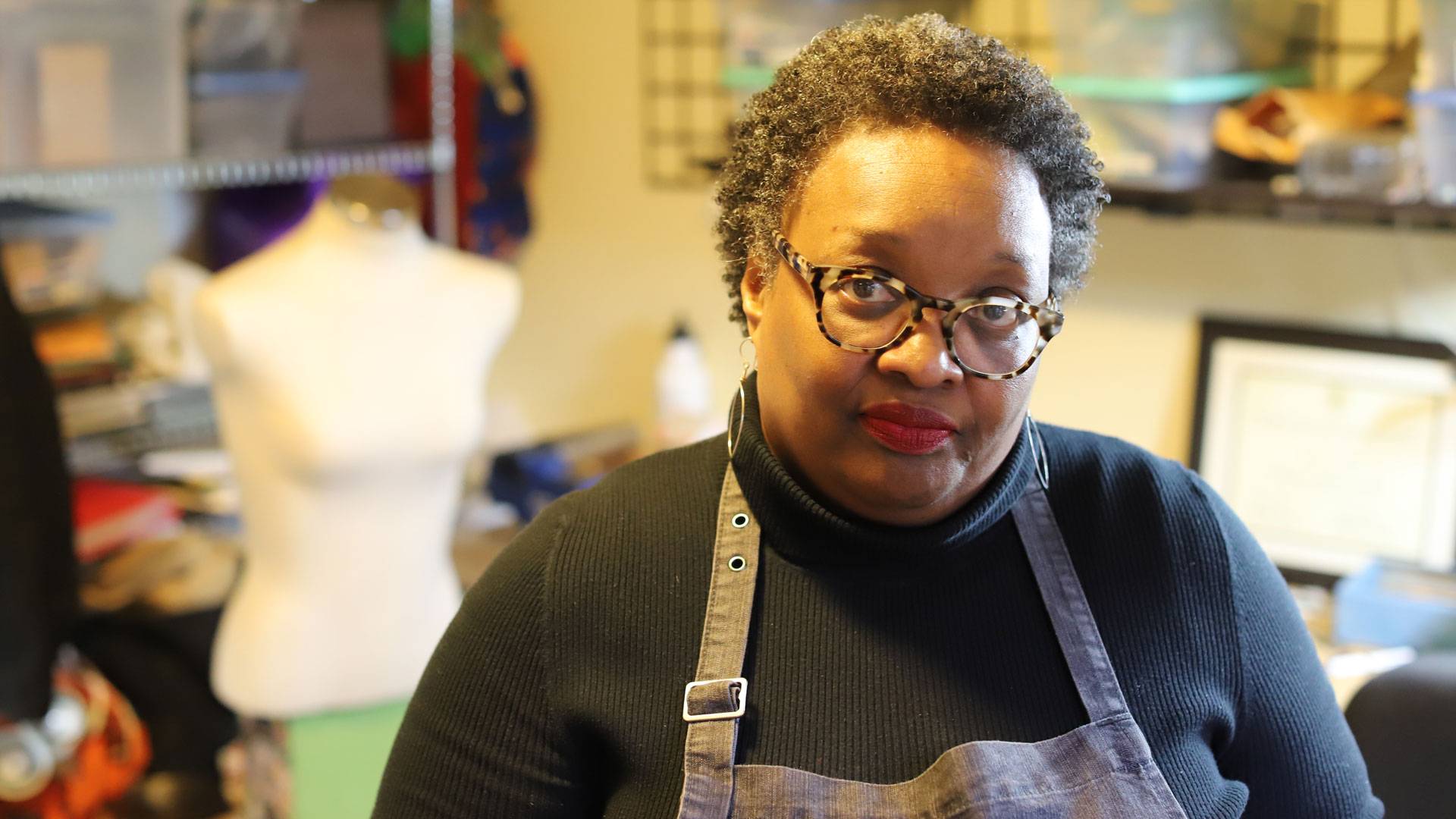Earlier this month, Oakland metalsmith Karen Smith put the finishing touches on Mamedjarra the Sacred, a sterling silver necklace. After nearly a year of work on the piece—a hammered crescent with dangling discs and frizzy strands—she shipped it to the Richmond Art Center, where it’s featured in a new group show, Art of the African Diaspora. And then she started to pack up her East Oakland workspace, where Smith is being displaced after falling behind on rent.
An Oakland Metalsmith Risks Instability to Bring Metal Arts to Black Girls
“It’s a huge transitional time for me,” says Smith, wearing hoops and a black apron, as she demonstrates an acetylene torch on solderite in the small studio. “But a good one.”
Smith, who moved to Oakland in 1995 (she refuses to share her age), is shifting her metalwork practice from jewelry to a fine arts context, and launching a new nonprofit, We Wield the Hammer, to bring the craft to other black women and girls through free, intensive workshops. The transition follows an influential apprenticeship in Senegal that took her abroad for most of 2018. “That was the start of the snowballing debt,” she says. “The trip was also a catalyst.”
Workspace and housing costs are the biggest challenges to artists in Oakland, according to a city report from 2016. What’s unique about Smith isn’t her financial struggles so much as her response: doubling down on as-yet-unprofitable projects. She’s loaning her equipment to a young metalsmith who’s teaching for We Wield the Hammer, which runs out of the Crucible in West Oakland, and foregoing a salary while fundraising for her fiscally-sponsored organization. She’s also speaking candidly about her experience, aiming to spur public investment in the arts.
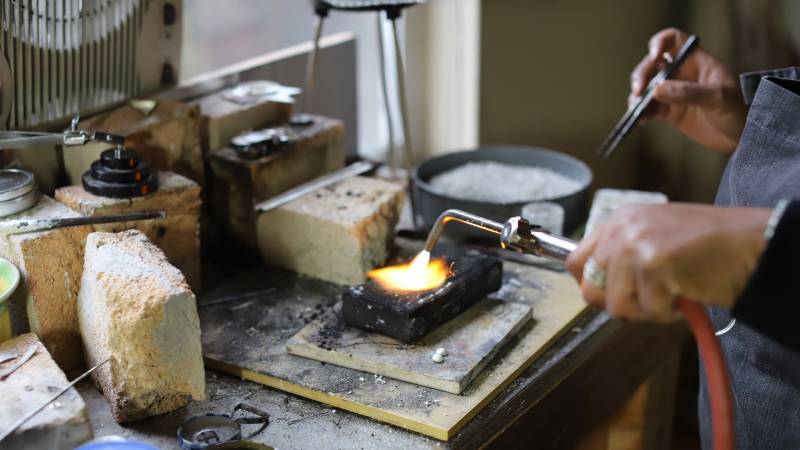
At a November meeting of the advisory committee to Oakland’s Cultural Funding Program (CFP), which awarded her nonprofit $4,999 in both 2018 and 2019 (though the latter check is still in the mail), Smith shared that her car was repossessed while she poured her energy into We Wield the Hammer, and advocated boosting grant amounts in the individual artist category.
“The cost of everything has gone up exponentially except grants and salaries,” she said during the public comment period. “The award is a pittance. I’m grateful—but it’s a pittance.” Smith continued, “I’m here because I want to put a face on what it means to be an artist in Oakland.”
Smith, who grew up in Brooklyn, divorced her husband in 2010. “I promised not to do things I don’t want to do anymore,” she says. She started a business, New Spirit Designs, making objects such as malas, or prayer beads, related to her practice as a Buddhist, which started 20 years ago at a daylong meditation. “I hadn’t been quiet for a day, ever, and over the course of the day my life changed,” she says. “I could actually listen to what was happening in my body.”
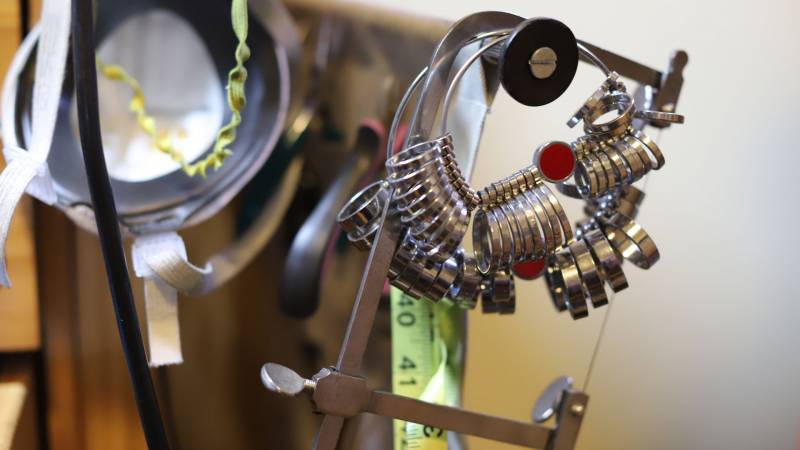
Working with beads, though, left Smith unfulfilled. Several years ago she commissioned a metal bracelet, providing drawings to a craftsperson. “It was beautiful but it wasn’t what I envisioned,” she recalls. “That’s what made me realize I need to work with metal.” Through library books and online forums, she learned wire-wrapping, and then to use a butane torch. “Because I had no background, no idea what I was doing, I started out with silver—great way to burn money.”
Smith has made wedding bands, which run up to $2,000 for gold, and sold jewelry at farmers markets and craft fairs. “It’s a hardscrabble way to make a living,” she says, noting the physical toll and upfront costs. Now, though, Smith wants to make more work like her piece for Art of the African Diaspora: sculpture, or “wearable art,” as she likes to say. She wants to use the metalsmithing techniques she learned through jewelry to create less everyday objects. As a former academic accustomed to valuing educational pedigree, being self-taught provokes some insecurity. “So I’m trying to position myself to consistently own the title ‘artist,’” she says.
“I mean, I’ll probably always make jewelry, like hoops—I’m a hoops whore,” she adds. “Every woman looks good in hoops. But hoops like these cost $40. I also make a pair that cost $340.”
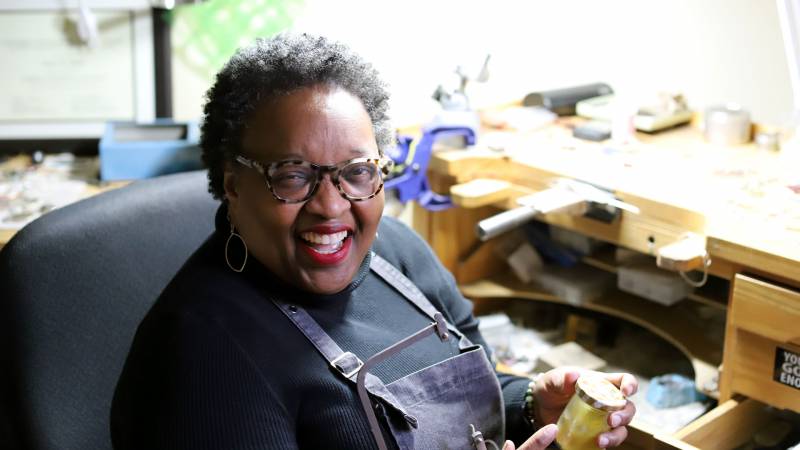
Smith describes her time in Senegal in 2018 as practically preordained, the result of one morning “hearing a voice.” She couldn’t find a formal apprenticeship program, but through academic contacts made some inroads with artisans in Dakar, the capital. “The first person who responded was a Senegalese man who said, ‘Does she know that women don’t wield the hammer? That we have that saying? That it’s transmitted father-to-son?’” she recalls. “I was like, sorry, no I don’t know about any of that. And he said, ‘Good, because it has to change.’”
She connected with a fifth-generation metalsmith named Ibrahim Sow and his apprentice son, Oumar Moida. “I think he thought initially that I was some young girl who wanted to make earrings on vacation for the ’gram,” she says. “When I got there he was amazed by my age, that I’m black—he was hella taken aback.” She learned to work from scratch: melting fine silver and copper to form sterling as well as making her own soldering alloy. She first stayed for two months and then, at Sow’s urging, returned for four-and-a-half more months later in 2018.
The patriarchal legacy of metalsmithing in Senegal created distance between Smith and the women around the artist village where she worked in Dakar. But she captured the interest of a young girl who’d stand silently in the studio doorway to watch. “I asked the teacher’s son about her and he said that she thought I was a ghost, that she’d never seen a woman doing what I was doing, so I had to be magic,” she says. “I thought, if she wants to learn, who will teach her?”
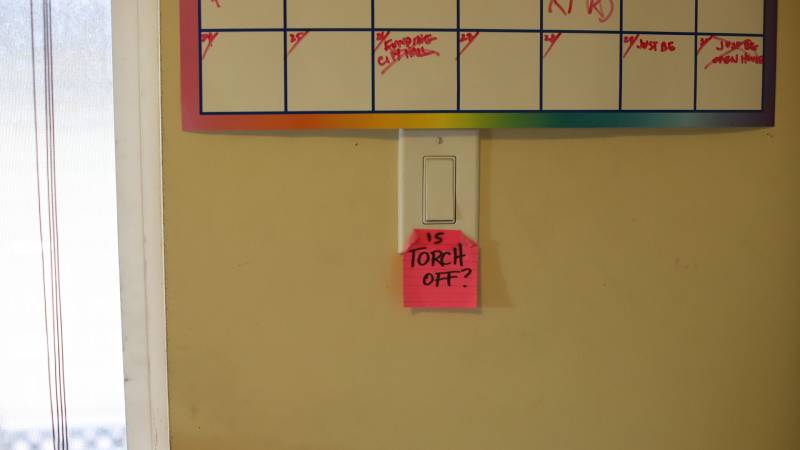
Smith returned from Dakar inspired but stressed; she’d spent most of 2018 without income, and started last year with an illness that prevented her from working for several weeks. “When you work for yourself there’s no unemployment, no sick pay,” she says. Still, Smith found some part-time work teaching at the Crucible (where co-teaching a two-day workshop pays approximately $300). The industrial arts center hosted the first We Wield the Hammer session last summer, and Smith secured the CFP grants to buy materials and pay a teacher, Ale’ah Bashir Baaqee.
The second eight-week session of We Wield the Hammer, which Smith plans to expand to Senegal, starts this month with a cohort of six black women and girls between the ages of 14 and 24. Until she can draw a salary from the organization, she plans to use workspace at the Crucible for personal projects. Because she must vacate her studio by the end of January, Smith is loaning her equipment to Baaqee, a metal artist from Oakland. “I’m letting her borrow all of these hammers,” Smith says in the soon-to-be-empty studio. “This is my favorite hammer.”
